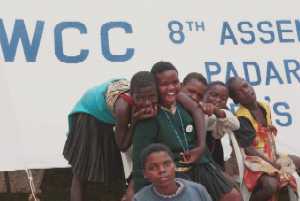By Munetsi Madakufamba
 Churches, which command
the largest constituency of any social gathering, have both a moral and spiritual
obligation to be the "voice of the voiceless" and stand up to defend
the integrity of creation.
Churches, which command
the largest constituency of any social gathering, have both a moral and spiritual
obligation to be the "voice of the voiceless" and stand up to defend
the integrity of creation.
This was the general feeling among delegates attending the solidarity stream of the Padare
offerings around campus yesterday.
As one delegate said, "More than 60 per cent of the world’s population is
suffering from war, natural disasters and, more silently, from debt burden. Women are
abused, children are exploited and millions of people have been uprooted.
"The church should use its vantage position to influence the international community
to act on these issues. The obscurity of globalisation is one issue that presents an
important challenge to the ecumenical agenda."
The solidarity stream covers discussions on the impact of globalisation, the negative
impacts of tourism, the rights and exploitation of children, uprooted people and refugees,
environmental concerns and climate change, and youth involvement in the struggle for
justice in the world.
Topics on globalisation, generally understood in the ecumenical movement as the economic,
political and social changes the world is going through, have generated particular
interest among the participants and offerings on the subject have ostensibly attracted
sizable crowds.
One offering on "Human Rights and Development" put the work of transnational
corporations under scrutiny, saying that these companies should not put emphasis on
profits alone, but on sustainable development for people and the environment.
A delegate from the Bread for the World, a German-based advocacy group, said
transnationals’ lack of care about human rights was demonstrated by the Ogoni case in
Nigeria, where civil rights leader Ken Saro-Wiwa was executed by his government in
November 1995 for challenging the work of oil giant Shell.
Shell has refused to clean oil that spilled in the Ogoni land, saying it was not
responsible for the spill although it has wide oil interests in the country and the
capacity to clean the affected areas.
A multimillion dollar project by Shell, ELF and Esso to transport by pipeline oil from
Chad through Cameroon to Europe was temporarily suspended after the community, including
ecumenical support groups, voiced concern about the environment as well as lack of
consultation with local communities.
Pastor Norbert Kenne, a delegate from Cameroon, said there was a moral anomaly given that
the transnationals were going to transform the oil in Europe and bring back the finished
and more expensive product to Africa, where the resource originally came from.
"Who is going to benefit from the project?" he asked. "It’s the
transnationals."
The offering echoed a proposal from other solidarity offerings about the need for an
independent monitoring and verification group to control the work of transnationals.
Concerns about the growing threat by transnationals which are getting more autonomy from
proponents of globalisation are not unfounded. Available statistics show that there are
more than 40,000 transnational corporations in the world today, about six times more than
they were a decade ago.
In 1996, the world’s top 200 transnationals had combined annual sales greater than
the combined economies of 182 of the world’s total 191 countries.
Back to top



Churches, which command the largest constituency of any social gathering, have both a moral and spiritual obligation to be the "voice of the voiceless" and stand up to defend the integrity of creation.
